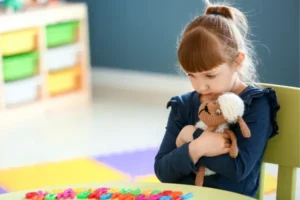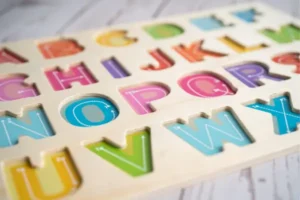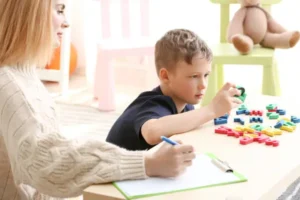Overview of the Topic
Speech development is essential for all children, but it’s especially crucial for those with autism, who often face unique challenges. Children with autism may experience speech delays, difficulty with articulation, or trouble using language in social settings. These issues can hinder their ability to communicate needs, interact with others, and navigate everyday situations. Educational toys can help address these challenges by providing engaging, interactive experiences that promote speech development. These toys encourage verbal communication, social interaction, and cognitive skills in a fun, low-pressure environment.
Purpose of the Article
This article explores how educational toys can support speech development in children with autism. By examining the role these toys play in enhancing communication, we aim to provide parents and caregivers with effective tools to help their children develop better language skills.
Why It Matters
Improving speech skills helps children with autism communicate more clearly, build stronger relationships, and gain independence. Enhanced communication also supports better social integration and a higher quality of life. Educational toys offer children a way to practice language in an enjoyable and supportive context, fostering confidence and growth.
Understanding Speech Development in Children with Autism
Communication Challenges in Autism
Children with autism often face various speech and language challenges. These can include delayed speech, articulation difficulties, or being non-verbal. Many children also struggle with understanding and using social cues, such as facial expressions, body language, or tone of voice. These challenges can make communication frustrating, leading to social isolation and difficulties at school or home. Effective communication is critical for expressing needs, building relationships, and participating in everyday activities.
Importance of Early Intervention
Early intervention is vital for improving speech development in children with autism. Addressing speech delays early on can improve long-term communication outcomes. With appropriate support, children can develop better speech skills, which are foundational for their social, emotional, and cognitive growth.
How Speech Development Affects Social and Cognitive Growth
Strong speech skills contribute to better social relationships, as children can express their thoughts, feelings, and desires more clearly. Speech development also boosts cognitive abilities, including problem-solving and understanding complex concepts. As children gain communication skills, they become more independent and confident in social and academic settings.
The Role of Educational Toys in Speech Development
Engagement with Sensory, Cognitive, and Social Skills
Educational toys engage multiple senses—visual, auditory, and tactile—which is essential for language development. Sensory-rich toys, such as those with bright colors or sounds, help children associate words with sensory experiences, improving comprehension and use of language. Many toys also promote cognitive development by encouraging children to solve problems, recognize patterns, and improve memory. Additionally, toys that encourage social interaction foster communication skills such as turn-taking, requesting, and responding.
How Educational Toys Encourage Verbal and Non-Verbal Communication
Educational toys promote both verbal and non-verbal communication. Some toys encourage children to imitate sounds or repeat words, while others promote non-verbal forms of communication like gestures, body language, and facial expressions. For example, role-play toys encourage the use of expressive language and gestures in social contexts, which helps children develop a fuller range of communication skills.
Building Speech in a Fun, Low-Pressure Environment
A key advantage of educational toys is that they create a fun, stress-free environment for practicing speech. Many children with autism experience anxiety when asked to speak, but educational toys allow them to practice language in an enjoyable, low-pressure setting. This reduces communication anxiety and motivates children to engage with language at their own pace.
Key Features of Educational Toys That Support Speech Development
Interactive and Responsive Toys
Toys that respond to a child’s actions, such as those that talk, make sounds, or ask questions, are especially effective in encouraging verbal communication. These toys prompt children to respond verbally, reinforcing language learning by linking words to actions or objects.
Toys That Encourage Repetition and Imitation
Repetition is key to speech development. Toys that encourage children to imitate sounds, words, or phrases help reinforce language patterns. This repetition builds fluency and confidence in using language.
Toys with Visual and Auditory Stimuli
Toys that incorporate visual cues (like images or symbols) and auditory feedback (such as songs or spoken words) strengthen speech comprehension and production. Visual stimuli help children associate words with images, while auditory cues reinforce recognition and articulation of those words.
Toys That Promote Social Interaction
Toys that involve turn-taking, role-playing, or cooperative tasks promote essential social communication skills. These toys provide opportunities for children to practice initiating conversations, taking turns, and responding appropriately, which are crucial for improving social language use.
Examples of Educational Toys for Speech Development in Children with Autism
Toy 1: Fisher-Price Laugh & Learn Smart Stages Chair
This interactive chair features buttons that activate songs, phrases, and sounds, promoting speech through repetition and engagement. The toy adapts to the child’s developmental stage, encouraging word repetition and learning basic vocabulary.
Toy 2: LeapFrog My Pal Violet
A customizable stuffed animal that plays songs, tells stories, and teaches words. Violet encourages verbal interaction and helps reinforce language skills through repetition and song.
Toy 3: VTech Touch and Learn Activity Desk
A touch-sensitive educational desk with interactive pages that teach letters, numbers, and shapes. The desk uses songs and phrases to encourage vocabulary acquisition and support language development.
Toy 4: Cozmo the Robot
This interactive robot engages children with games that involve verbal prompts and responses. Cozmo helps children practice verbal communication by responding to commands and engaging in interactive play.
Toy 5: Melissa & Doug Wooden Scoop and Serve Ice Cream Counter
A pretend play toy that allows children to serve ice cream, promoting social language skills through role-play. This toy encourages turn-taking, making requests, and using descriptive language in social contexts.
How to Choose the Right Educational Toy for Your Child’s Speech Development
Assessing Your Child’s Needs
Start by identifying your child’s specific speech challenges, whether they involve speech delays, articulation issues, or social language skills. This understanding will guide you in choosing toys that target those needs.
Consulting Professionals
Speech-language pathologists (SLPs) can assess your child’s speech development and recommend appropriate toys. Their expertise ensures that the toys you choose align with your child’s developmental stage and communication goals.
Trial and Error Approach
Since every child is different, finding the right toy may require some trial and error. Introduce a variety of toys and observe which ones engage your child, encourage verbal responses, and support their speech development. This process helps you identify the most effective toys for your child’s needs.
The Benefits of Educational Toys for Speech Development
Improved Communication Skills
Educational toys help children develop both verbal and non-verbal communication. They promote speaking, listening, and understanding, which improves children’s ability to express themselves and understand others.
Enhanced Social Interaction
Toys that encourage role-playing and turn-taking help children develop crucial social communication skills. These activities foster stronger relationships with peers and family and improve overall social interaction.
Increased Confidence and Independence
Educational toys offer a low-pressure environment for children to practice speech, boosting their confidence as they communicate more effectively. This leads to greater independence in expressing their needs and ideas.
Stronger Parent-Child Bonds
Interactive play with educational toys strengthens the bond between children and caregivers. Engaging in shared learning experiences improves communication and creates meaningful connections between parents and their children.
Conclusion
Summary of Key Points
Speech development is essential for children with autism, and educational toys can play a significant role in enhancing communication skills. These toys promote verbal and non-verbal communication, social interaction, and confidence, helping children make progress in a supportive, enjoyable way.
Encouragement for Parents and Caregivers
With the right educational toys, children with autism can improve their speech and communication skills. Parents and caregivers are vital in providing the tools and support children need to succeed.
Final Thoughts
Patience and consistency are key when using educational toys to support speech development. Although progress may take time, every step forward is a meaningful achievement. With the right approach and tools, children with autism can make lasting improvements in their communication skills.




